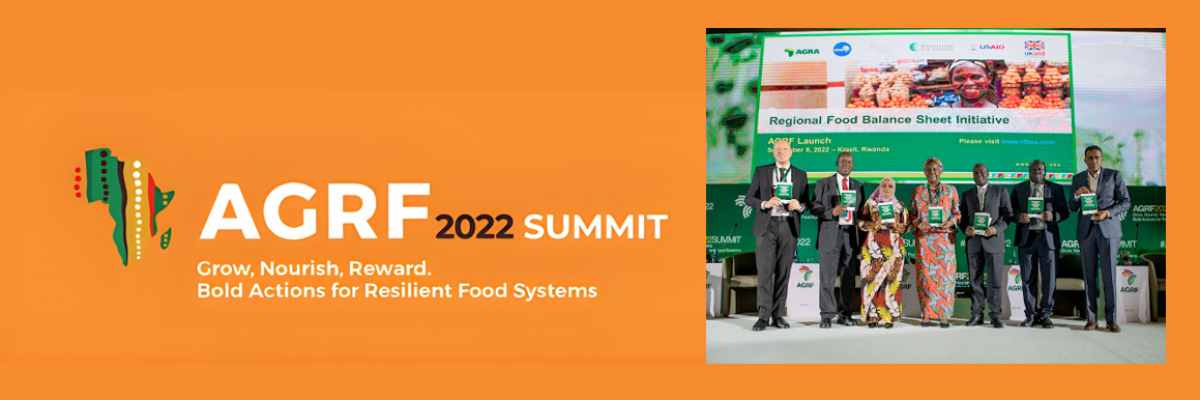NASA Harvest At AGRF Summit in Rwanda
The 2022 AGRF Summit took place from September 5th through September 9th in Kigali, Rwanda. The event brought together diverse stakeholders worldwide to take practical actions and share lessons to move African agriculture forward. During this week, NASA Harvest and our partners officially co-launched the Regional Food Balance Sheet (RFBS), introducing the innovative and timely initiative to a new audience of targeted stakeholders and prospective users. Harvest Africa Program Director and Africa Food Prize 2020 Laureate Dr. Catherine Nakalembe also participated in the AGRFSession, “Accelerating data-driven strategies for boosting food systems transformation,” on a panel which posed the question “in whose hands will our agriculture data be in the next 5-10 years?” Additionally, the NASA Harvest team co-developed a Side Event that preceded the official launch at the AGRF with a focused session that encouraged different national leaders to adopt, test and provide feedback on the RFBS Dashboard.
African Agriculture
Across Sub-Saharan Africa, labor and land productivity are relatively low, leading to food shortages, poverty, and biodiversity loss. 40% of the population lives below the poverty line, and 76% of working adults in extreme poverty work in agriculture. Overall, the productivity of Sub-Saharan Africa is more than 50 times lower than in the most agriculturally productive countries. For productivity and poverty to improve, farmers need access to local markets – many of which lack the infrastructure to get to them quickly. Trade policies between other countries have also significantly impacted Africa’s export markets, specifically the EU’s agricultural policies.
Additionally, crop yields across much of Africa pale compared to other countries, at about 50% of India’s and 20% of US yields. Due to their lack of yields, many farmers are forced to use more land to attempt to produce the same crops, leading to further habitat destruction and biodiversity loss.
Regional Food Balance Sheet
Key decision-makers need more reliable, timely, and accurate data for food trade and security. The RFBS initiative creates a more predictable trade and policy environment in East and Southern Africa (ESA) to increase food security and enhance regional trade and investment. This collaborative and multi-stakeholder engagement is working towards expanding the use of near real-time data on critical food crops.
The RFBS captures critical data that shows a complete picture of regional food availability, including production, imports, change in stocks on the supply, exports, food availability for human consumption, losses, feed, seed, and industrial utilization. This innovative tool estimates shortages and surpluses in the region and develops projections of future food supply and demand needs, which help to set targets for agricultural production and trade.
The RFBS Implementing Partners include COMESA, AGRA, RCMRD, the Bureau for Food and Agricultural Policy (BFAP), Tetra Tech, and NASA Harvest / University of Maryland. Together these partners have developed a digital RBFS platform that ingests data from various public and private sources and then leverages advanced analytics and tools to develop near real-time and forward-looking food balance estimates.
The official launch of the RFBS tool on Thursday, September 8th, during the AGRF main event schedule. This event was graced by the COMESA Secretary General, Rwanda’s Minister of Trade, Malawi’s Minister of Trade, Tanzania’s Minister of Agriculture, Zambia’s Minister of Agriculture and livestock, AGRA’s President, FCDO Group Head for Africa Economic Development, USAID’s Senior Deputy Assistant Administrator in the Bureau for Resilience & Food Security, FAO, and IFPRI. The launch event had a blended format which allowed participants to attend the event physically at the Kigali Convention Center or join virtually via online platforms. The launch highlighted the viability and value of the RFBS Dashboard and described its scalability to a broad audience. That entire week, AGRA and Tetra Tech also maintained an exhibition booth at the conference venue, providing live and interactive demonstrations of the RFBS to visiting patrons.
Our attendance not only created important new visibility for the RFBS initiative but also captured the contact information of new prospective users, as well as critical comments and suggestions for a more effective implementation and roll-out.
Dr. Nakalembe participates in the AGRFSession, “Accelerating data-driven strategies for boosting food systems transformation,” for Panel Discussion 1: “In whose hands will our agriculture data be in the next 5-10 years?”
Regional Food Balance Sheet Implementation Side Event
The side event took place on September 5, 2022, with the goal of providing targeted national representatives and other stakeholders with a thorough understanding of the purpose and capacity of the RFBS Dashboard, and how this product can be scaled across the broader region and include additional data, such as new crop varieties. We shared workable knowledge of the RFBS workflow, including lessons learned from collaborating with diverse partners and best methods for systematizing the creation of yield models into relevant and accessible data presented across different mediums. This was also an opportunity to proceed the official launch at the AGRF with a focused session that encouraged different national leaders to adopt, test and provide feedback on the Dashboard.
Among the twenty-seven (27) attendees, some had previously used earlier versions of the Dashboard while others were being introduced for the first time. The Implementing Partners used this session as an opportunity to make the case for why more data is needed from these partners and other sources to improve model confidence. Many of the questions that arose reflected an interest in additional information - more crop varieties, more countries, and more factors to be considered in the model predictions, such as fertilizer usage and irrigation practices. Our hope is that these attendees not only continue to use the Dashboard, but become champions for the RFBS in their own organizations.
Attendees at the AGRF Side Event included project leaders, and country stakeholders and potential RFBS users from both the public and private sectors .



